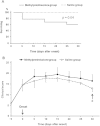Action mechanism of corticosteroids to aggravate Guillain-Barré syndrome
- PMID: 26355080
- PMCID: PMC4565078
- DOI: 10.1038/srep13931
Action mechanism of corticosteroids to aggravate Guillain-Barré syndrome
Abstract
Corticosteroids have been proved to be ineffective for Guillain-Barré syndrome, but the mechanism remains unknown. In a rabbit model of axonal Guillain-Barré syndrome, treatment with corticosteroids significantly reduced macrophage infiltration in the spinal ventral roots and the survival rate as well as clinical improvement. On 30(th) day after onset, there was significantly higher frequency of axonal degeneration in the corticosteroids-treated rabbits than saline-treated rabbits. Corticosteroids may reduce the scavengers that play a crucial role for nerve regeneration, thus delay the recovery of this disease.
Conflict of interest statement
Prof. Yuki receives grant support from the Singapore National Medical Research Council (IRG 10nov086 and CSA/047/2012 to N.Y.) and serves as an editorial board member of Expert Review of Neurotherapeutics, The Journal of the Neurological Sciences, The Journal of Peripheral Nervous System, Journal of Neurology, Neurosurgery & Psychiatry and Journal of Alzheimer’s disease. The other authors have no financial disclosure.
Figures



References
-
- Hughes R. A. C., Newsom-Davis J. M., Perkin G. D. & Pierce J. M. Controlled trial prednisolone in acute polyneuropathy. Lancet 2, 750–753, (1978). - PubMed
-
- Guillain-Barré Syndrome Steroid Trial Group. Double-blind trial of intravenous methylprednisolone in Guillain-Barré syndrome. Lancet 341, 586–590 (1993). - PubMed
-
- Hafer-Macko C. E. et al. Immune attack on the Schwann cell surface in acute inflammatory demyelinating polyneuropathy. Ann Neurol 39, 625–635, (1996). - PubMed
Publication types
MeSH terms
Substances
LinkOut - more resources
Full Text Sources
Other Literature Sources
Medical

